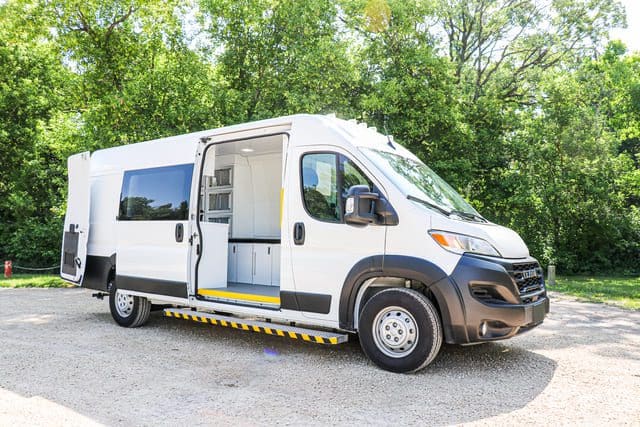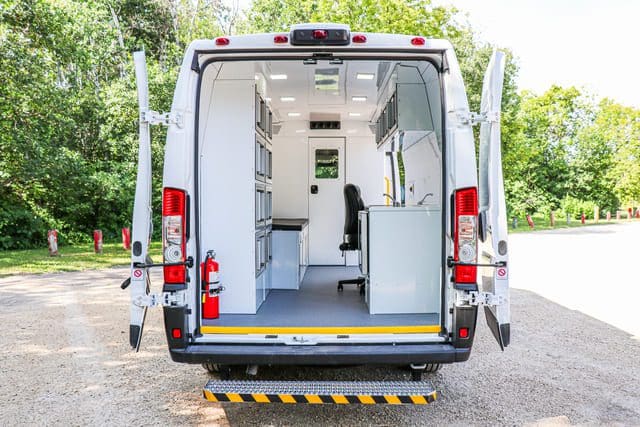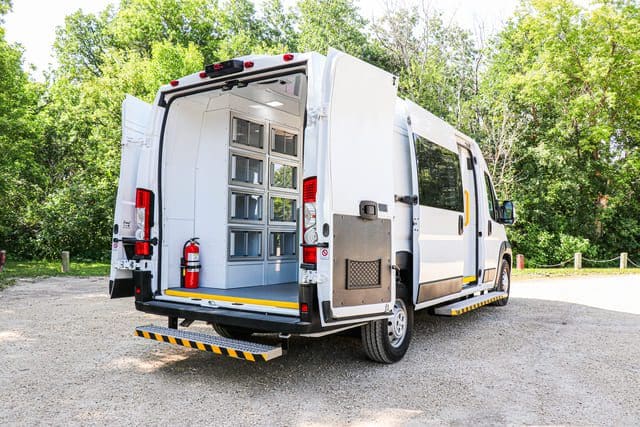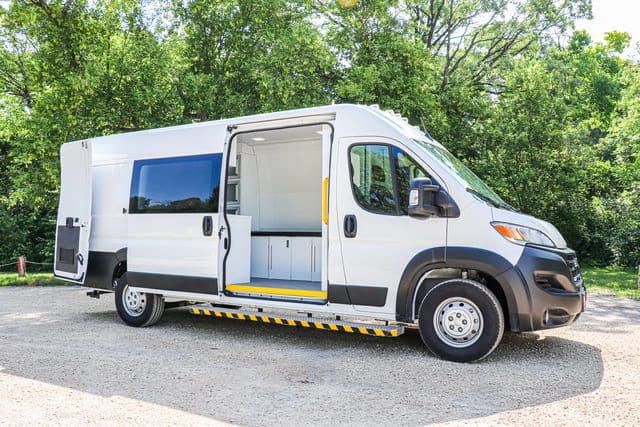Often, when people urgently need medical help, it’s tough for your organization to provide it because they’re either too far away or you don’t have the right tools and resources.
Your team might feel a lot of pressure because every minute is important in these situations. You’re looking for ways to reach more people quickly and effectively. Imagine you’re leading a health team in California, and you hear about a special fund that could really help your organization handle emergencies better. This is where the Crisis Care Mobile Units (CCMU) program grant comes in, and finding out about it could change how you help others.
At AVAN Mobility, we know how much these grants mean to organizations like yours. Getting timely and efficient healthcare support in California can be the deciding factor between life and death for some people. When it comes to making that difference, the CCMU grant can be the boost your organization needs to launch a mobile medical unit and start saving lives.
We have over a decade of experience manufacturing different types of mobile medical units. We’re writing this article so you have a better understanding of how to take advantage of the CCMU grant to skyrocket your mobile crisis response team’s impact.
What is the CCMU program grant?
In California, and as we mentioned earlier, there’s a special program called the Crisis Care Mobile Units program. It’s run by a part of the government called the California Department of Health Care Services (DHCS).
This program aims to provide funding to help local organizations build and improve mobile units that help people who are dealing with mental health crises and substance abuse.
Where does the money come from?
The CCMU program gets its money from two places:
State general funds: A big chunk of the money, $150 million, is from the Government of California. These funds are part of the Behavioral Health Continuum Infrastructure Program. This money is set aside to help build solutions that offer support right when and where it’s needed.
Federal funding: There’s also $55 million that comes from a federal organization called the Substance Abuse and Mental Health Services Administration (SAMHSA).
What is the impact of the CCMU program?
So far, the CCMU program has given out more than $185 million to different organizations. It has been split between 48 local mental health organizations and 24 tribal groups. They’ve used this money to start or improve 390 teams that respond to mental health crises. These teams go out and help people who are having a tough time, right in their community.
Who is eligible for funding?
The eligible organizations that can apply for CCMU funding include:
- Tribal organizations
- Organizations in counties or cities throughout California
How do you apply for CCMU funding?
If your organization is on the lookout for grants for mobile medical vehicles, you’ll want to bookmark this link from the California Department of Health Care Services. This website lists all of the current and future funding opportunities that you can apply for. It also lists some of the closed funding opportunities that have already expired.

If you’re curious about data on some of the previous funding efforts from the CCMU grant, you can view some of the dashboards associated with each funding round. You can click through to see how many individuals have been served, along with key highlights and measurable statistics to reflect their impact.
Why are mobile crisis units important in California?
Mobile crisis units are important for helping people who urgently need care for mental health, drug problems, suicide, and other issues. The numbers below show that more and more people in California need this kind of help.
Mental health: About 1 in 7 adults in California has some kind of mental health issue. Since California is so big and spread out, not everyone can get to mental health services easily, especially in places far from big cities.
Substance abuse: Deaths from drug overdoses have gone up a lot, especially from opioids. In 2021 alone over 10,000 people died from a drug overdose in California, showing a huge need for help.
Suicide rates: Suicide is one of the top reasons young people and teens die in California. This shows how important it is to get help to people fast.
The role of mobile crisis units
Let’s take a closer look at three key aspects of mobile crisis units in California.
Immediate response: When someone is having a really hard time, getting help to them quickly is necessary. Mobile crisis units are versatile and can get to people anywhere in California much quicker than traditional brick-and-mortar facilities.
Accessibility and outreach: These units make it easier for people in communities that don’t have good access to health services nearby. They can drive out into the community and reach people who might not ask for help because they are embarrassed or don’t have the means.
Tailored solutions: Different areas in California have different needs. Mobile crisis units can be set up in ways that meet these specific needs, making sure the help they give is right for each community.
Reducing hospitalizations and jail time: Mobile crisis response units can help keep people out of hospitals and jail, which often aren’t the right places for people with mental health and drug issues.
Saving lives: Quick help from mobile units can stop suicide tries and deaths from overdoses.
Educating the public: Your organization can also use these units to help teach people about mental health and drug issues.
For California, a state known for new ideas and diversity, mobile crisis units are a smart way to address a big problem. They’re essential tools that help make life better for everyone, especially those who are struggling.
Take a look at how the Monterey County Behavioral Health mobile crisis team secured CCMU funding to purchase a new vehicle to help people in need.
What is your path forward with AVAN Mobility?
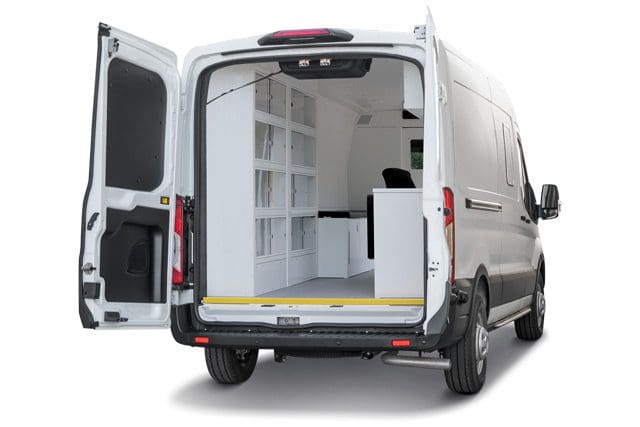
There’s a good chance you landed on this article while looking for funding opportunities for a mobile medical unit in California.
If you’ve made it this far, you’re now more familiar with the CCMU program grant and the impact it can have on individuals all over California.
At AVAN Mobility, we know that it feels frustrating trying to secure funding opportunities to get your program moving forward. We also understand the transformative impact a mobile medical unit can have in your community—delivering healthcare services where they’re most needed, when they’re most needed.
That’s why we’re committed to informing you about the CCMU funding and supporting your journey from concept to operation. Got questions about this article or our mobile medical units? Click the button at the end to contact a mobility expert.
Alternatively, check out our other articles for further guidance on purchasing a mobile medical unit.
Lastly, check out our guide on securing grants to stay proactive about securing funding opportunities.
FAQ
Q: Who can apply for CCMU funding?
A: Tribal groups and health organizations across California are eligible. They must assist with mental health or drug issues and require efficient outreach tools.
Q: What can we use the CCMU money for?
A: The money can be used to set up or improve mobile crisis units. This includes buying vehicles equipped for medical needs, training staff to handle emergencies, and starting programs to reach people in far or underserved areas. The goal is to make urgent care faster and more effective.
Q: How do we apply for CCMU funding and what are the deadlines?
A: You can apply on the California Department of Health Care Services website. Keep checking the site for updates on when you can apply. Make sure to prepare your documents and project plans early to meet the application deadlines.
